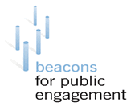Newcastle University (UK)

Newcastle University can trace its origins to a School of Medicine and Surgery, established in Newcastle in 1834, and to Armstrong College, which was founded in the city in 1871 for the teaching of physical sciences. The University’s relationship with the city of Newcastle upon Tyne has been brought into focus with the arrival of the new Vice-Chancellor, South African-born Professor Chris Brink, in 2007. His vision is to reinvent the notion of Newcastle as a civic university, driving forward the economic, social and cultural development of the North East of England. Newcastle University’s website>>
The Beacon for Public Engagement 
The Beacon for Public Engagement is a UK-wide scheme to pilot public participation in university research. The Newcastle-Durham beacon is a partnership between Newcastle and Durham universities together with the Centre for Life. The Beacon will enable more effective two-way knowledge exchange between researchers and people in wider society. It also aims to transform the culture within the universities such that participatory practices become central to their strategy. Learn more>>
Low Educated Second Language and Literacy Acquisition by Adults
 LESLLA was established in 2004 as an international forum on the acquisition of proficiency in spoken and written English by adults who are not literate in their first language. As such LESLLA is an acronym for “Low Educated Second Language and Literacy Acquisition by Adults”. Many traditional programmes for teaching English to speakers of other languages assume that the students will have literacy skills in their first language, so that they will be familiar with the basics of spelling, grammar and syntax. When this is not the case -as is increasingly common in the UK, particularly amongst refugees from east African countries and Afghanistan – then literacy must be taught from scratch at the same time as teaching a new language: a tall order for both students and their teachers. Considerable innovation in teaching and learning strategies is called for, and LESLLA exists to share ideas and effective practices in this rapidly-evolving area of literacy and language learning. For more details, read here>>
LESLLA was established in 2004 as an international forum on the acquisition of proficiency in spoken and written English by adults who are not literate in their first language. As such LESLLA is an acronym for “Low Educated Second Language and Literacy Acquisition by Adults”. Many traditional programmes for teaching English to speakers of other languages assume that the students will have literacy skills in their first language, so that they will be familiar with the basics of spelling, grammar and syntax. When this is not the case -as is increasingly common in the UK, particularly amongst refugees from east African countries and Afghanistan – then literacy must be taught from scratch at the same time as teaching a new language: a tall order for both students and their teachers. Considerable innovation in teaching and learning strategies is called for, and LESLLA exists to share ideas and effective practices in this rapidly-evolving area of literacy and language learning. For more details, read here>>
Research: “The Role of the University in the Development of its City and Region”
 John Goddard, Professor of Regional Development Studies and Deputy Vice Chancellor, delivered this paper in March 2008. Read about his journey “as an academic who has sought to build bridges from the world of thought into the world of practice.” “What I have learned on this journey,” Goddard writes, “is that academic work, in my case in the social sciences, can be shaped by and shape the wider society within which universities are embedded. It is not a one way street, but a recursive and cumulative process involving mutual learning. One of the advantages for me personally of undertaking a succession of jobs in one institution and one region, has been the benefits of accumulating knowledge, understanding and learning from others.” Read the paper>>
John Goddard, Professor of Regional Development Studies and Deputy Vice Chancellor, delivered this paper in March 2008. Read about his journey “as an academic who has sought to build bridges from the world of thought into the world of practice.” “What I have learned on this journey,” Goddard writes, “is that academic work, in my case in the social sciences, can be shaped by and shape the wider society within which universities are embedded. It is not a one way street, but a recursive and cumulative process involving mutual learning. One of the advantages for me personally of undertaking a succession of jobs in one institution and one region, has been the benefits of accumulating knowledge, understanding and learning from others.” Read the paper>>